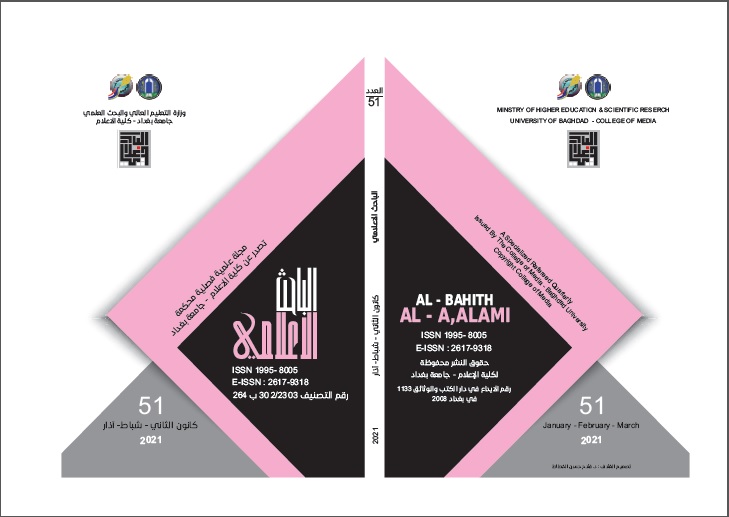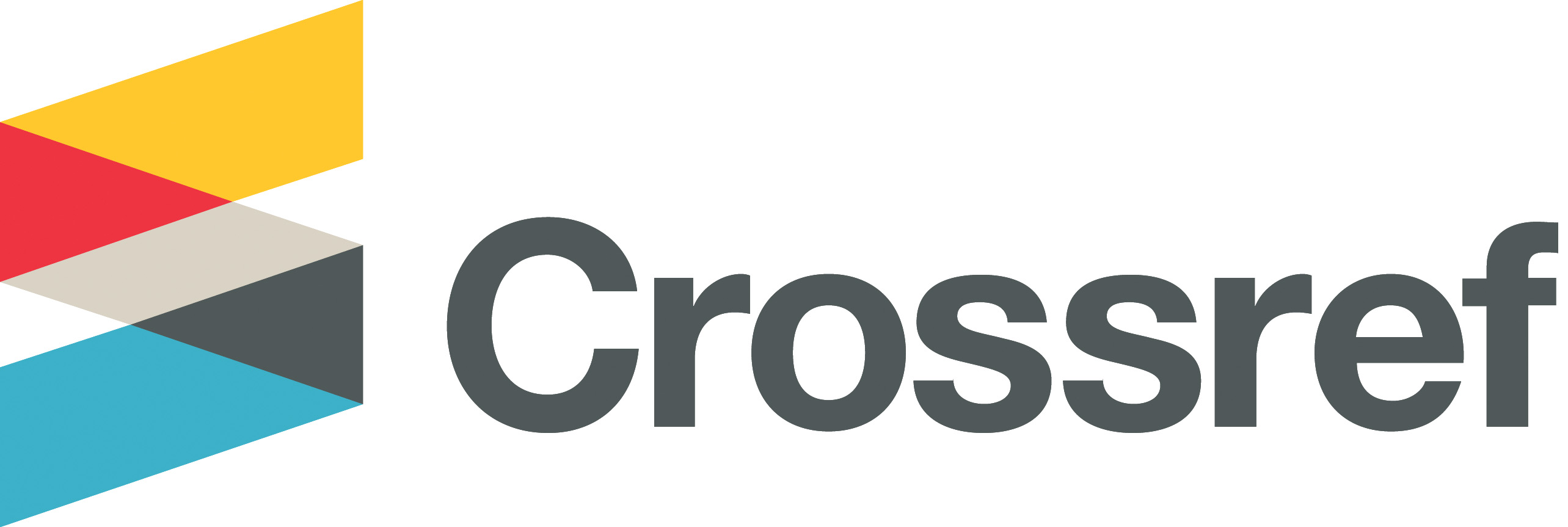MOTIVES FOR STUDENTS TO BE EXPOSED TO EDUCATIONAL PROGRAMS ON TV CHANNELS (Iraqi educational channels as a model)
DOI:
https://doi.org/10.33282/abaa.v13i51.749Keywords:
Motives - students - educational programs - TV channels - Iraq satelliteAbstract
The educational function of television is one of the basic functions in light of the technical development that included the specialized satellite channels in all its fields, including the educational field, as its role became parallel to the role of educational institutions. These studies are among the descriptive studies in terms of the type of study methodology that describes the phenomenon, interprets its and extract the results and relationships between the variables. The study sample was multistage (random and intentional) included the students of the sixth academic and literary preparatory stage in the city of Baghdad.
The study problem was summarized by the following main question:
( What are the motives for the exposure of the students of Baghdad to the Iraqi educational channels ? What is the extent of the gratifications that have been achieved as a result of this exposure?).
Leading to the secondary questions that branched from it, the most important of which are:
- What are the habits and patterns of students' follow-up and educational programs in the Iraqi educational satellite channel?
- What are the motives for students' exposure to educational lessons in the Iraqi educational satellite channel?
- The study reached several results that can be summarized as follows:
- The high degree of exposure of the student population to the Iraqi educational satellite programs, especially for the students of the completed classes, thus achieving the result of the assumption (that the audience of the recipients is an active audience and its use of the media is a deliberate use to achieve a certain benefit).
- The results showed that the program plans included the preparation and broadcast of enrichment programs to address various issues and activities of interest to the student group, such as a targeted audience from the satellite channel?
The results indicated the high level of utilitarian motivations at the level of ritual motives of the study sample while they were following the educational channels of Iraq, including the adoption of the interesting method of providing educational lessons, as the extent of follow-up increased exponentially with a high degree of benefit from the contents of these programs.
Downloads
References
المتخصصة والاشباعات التي تحققها لهم. القاهرة: المكتب العربي للمعارف.
حسن عماد مكاوي ، و ليلى حسين السيد. ) 2010 (. الاتصال و نظرياته المعاصرة
)الإصدار ط 9(. القاهرة: الدار المصرية اللبنانية
دحام علي حسين. ) 2012 (. دوافع استخدام الجمهور العراقي القنوات التلفزيونية
الفضائية وحدود الإشباعات المتحققة) اطروحة دكتوراه غير منشورة(. بغداد،
جامعة بغداد: كلية الإعلام.
رشا عبد الهادي صالح. )كانون الأوَّل, 2017 (. اتجاهات طلبة المرحلة الإعدادية
نحو البرامج التعليمية الفضائية. مجلة كلية التربية الأساسية للعلوم التربوية
والإنسانية) 36 (.
شيماء ذو الفقار زغيب. ) 2017 (. مناهج البحث والاستخدامات الاحصائية في
الدراسات الإعلامية )الإصدار ط 3(. القاهرة: الدار المصرية اللبنانية.
عبد الأمير عبود حسين. ) 2019 (. علاقة القنوات التعليمية التلفزيونية العراقية في
تدعيم القيم التربوية لطلاب المدارس الثانوية) اطروحة دكتوراه غير منشورة( .ليبيا، مدرسة الإعلام والفنون، قسم الإعلام: الاكاديمية الليبية.
عمار طاهر محمد. ) 2017 (. إشباع فضائية العراق التربوية الحاجات التعليمية لطلبة
الصفوف المنتهية ) دراسة ميدانية على عينة من طلبة مدارس بغداد(. مجلة آداب
الكوفة) 30 (.
كامل خورشيد مراد. ) 1997 (. تغطية وكالة الانباء الفرنسية لقضايا العالم الثالث:
)اطروحة دكتوره غير منشورة(. بغداد، جامعة بغداد : كلية الآداب: قسم الاعلام.
محمد عبد الرؤوف أبراهيم. ) 2000 (. الصحافة المصرية الصادرة باللغة الانكليزية
دراسة للمضمون والجمهور خلال عامي 1997 ، 1998 ) أطروحة دكتوراه غير
منشورة(. القاهرة، جامعة حلوان: كلية الآداب.
مرفت الطرابيشي ، و عبد العزيز السيد. ) 2004 (. نظريات الاتصال. القاهرة: دار
النهضة العربية.
نهى عبد الجواد أحمد لطفي. ) 2007 (. استخدامات طلاب المدارس الثانوية لغات
للمواد المقدمة باللغة الانجليزية في التلفزيون. القاهرة، جامعة عين شمس: معهد
الدراسات العليا للطفولة.
هيئة الإعلام والاتصالات. ) 25 آب, 2019 (. جدول بالجهات المرخصة من قبل قسم
التراخيص في هيئة الإعلام والاتصالات. تم الاسترداد من / www.CMC.IQ/ar
License.IQ
وفاء السيد خضر. ) 2018 (. الإعلام التربوي وسائله ودوره في مجال التربية والتعليم.
القاهرة : دار العالم العربي.Morgan, K. a.« .) 1970( Determining Sample Size For Research Activities» .
Educational and Psyschologyical Measurement.)30(
(1) Ammar Taher Muhammad, satisfying the educational satellite of Iraq,
the educational needs of the students at the completed classes. A field
study on a sample of students from Baghdad schools, (Iraq: University
of Kufa, Journal of Literature of Kufa, No. (30), 2017), p. 241.
(2) Media and Communications Authority, a list of the entities licensed by
the Licensing Department of the Media and Communications Authority,
entry date 25/06/2019, quoting from:
www.CMC.IQ/ar/License.IQ
(3) Shaima Zulfiqar Zogheib, Research Methods and Statistical Uses in
Media Studies, (Cairo: The Egyptian Lebanese House, 3rd edition,
2017), p. 249.
(4) Kreijcie and Morgan in their 1970 article «Determining Sample Size For
Research Activities» (Educational and Psyschologyical Measurement,
# 30, PP.607-610).
Quoted from, Barakat Abdel-Aziz, Media Research Methods: Theoretical
Principles and Application Skills, Cairo, Dar Al-Kitab Al-Hadith, 2011,
p. 141.
(5) Abdul-Amir Abboud Hussein, The Relationship of Iraqi TV Educational
Channels in Supporting Educational Values for Secondary School
Students, Unpublished PhD thesis (Libya: Libyan Academy, School ofMedia and Arts, Department of Information, 2019), p. 46.
(6) Rasha Abdel-Hadi Saleh, Preparatory Stage Students’ Attitudes Toward
Space Education Programs, Published Research, University of Babylon,
Journal of the College of Basic Education for Educational and Human
Sciences, No. 36, December 2017.
(7) Noha Abdel-Jawad Ahmed Lutfi, Uses of High School Students as
Languages for English Presented Materials on Television, (Cairo:
Institute of Higher Studies for Childhood, Ain Shams University, 2007).
(8) Iman Abdul Rahman Al-Naqeeb, Adolescents’ Uses of Accident News
(Cairo: Arab Knowledge Bureau, 2015, p. 14).
(9) Mervat Al-Tarabishi and Abdel Aziz Al-Sayed, Communication Theories,
Cairo: Arab Renaissance House, 2004, p. 242. See more:
- Kamel Khurshid Murad, Mass Communication and Media, Development,
Characteristics, Theories (Amman: Dar Al-Maysarah, 2011), pp. 146-147
- Noha Abdul-Jawad Ahmed Lutfi, The Use of Secondary School Students
as Languag es for English-Presented Materials in Television and the
Verifications Verified from It, previously mentioned source, p. 48.
(10) Dahham Ali Hussein, the motivations for the Iraqi public to use satellite
TV channels and the limits of the achieved gratifications, unpublished
doctoral thesis, College of Information, University of Baghdad 2012, p.
35.
(11) Muhammad Mahmoud Bani Younis, Motivation Psychology and
Agitation, (Amman: Al-Maysara House for Publishing and Distribution,
5th edition, 2018), p. 14.
(12) Hassan Emad Makkawi and Laila Hussein Al-Sayed, Communication
and Contemporary Theories, (Cairo: The Egyptian-Lebanese House,
9th Edition, 2010, p. 246).
(13) Mohamed Abdel-Raouf Ibrahim, the Egyptian press published in the
English language - a study of the content and the public during the
years 1997, 1998, doctoral thesis, Helwan University, Faculty of Arts,
2000 AD, p. 146.
(14) Wafaa Al-Sayed Khidr, Educational Media, Means and Role in the Field
of Education, (Cairo: Dar Al-Alem Al-Arabi, 2018), p. 173.
(15) Hasan Ali bin Domei and Omar Hussein Al-Omari, Fundamentals in
Design and Production of Teaching Aids (Kuwait: Al-Falah Library for
Publishing and Distribution, 2005), pp. 299-230.
(16) Mr. Muhammad Shaalan, Educational TV in the Age of Ancomedia,
previously mentioned source, p. 78.
(17) Ammar Taher Muhammad, Satisfying the Educational Space of Iraq,
the Educational Needs of Students for Finished Classes, previously
mentioned source, p. 239.
(18) Wafaa Al-Sayed Khidr, Educational Media, Means and Role in the Field
of Education, (Cairo: Dar Al-Alem Al-Arabi, 2018), p. 172.
(19) Mr. Muhammad Shaalan, Educational TV in the Age of Infomedia,
Cairo: Modern Book House, 2011, p. 83.
(20) Wafa Al-Sayed Khidr, Educational Media, Means and Role in the Field
of Education, (Cairo: Dar Al-Alem Al-Arabi, 2018), p. 176.
Downloads
Issue
Section
License
Authors retain copyright and grant the journal right of first publication with the work simultaneously licensed under a Creative Commons Attribution License (CC BY 4.0) that allows sharing the work with recognition of authorship and initial publication in ABBA journal.


















